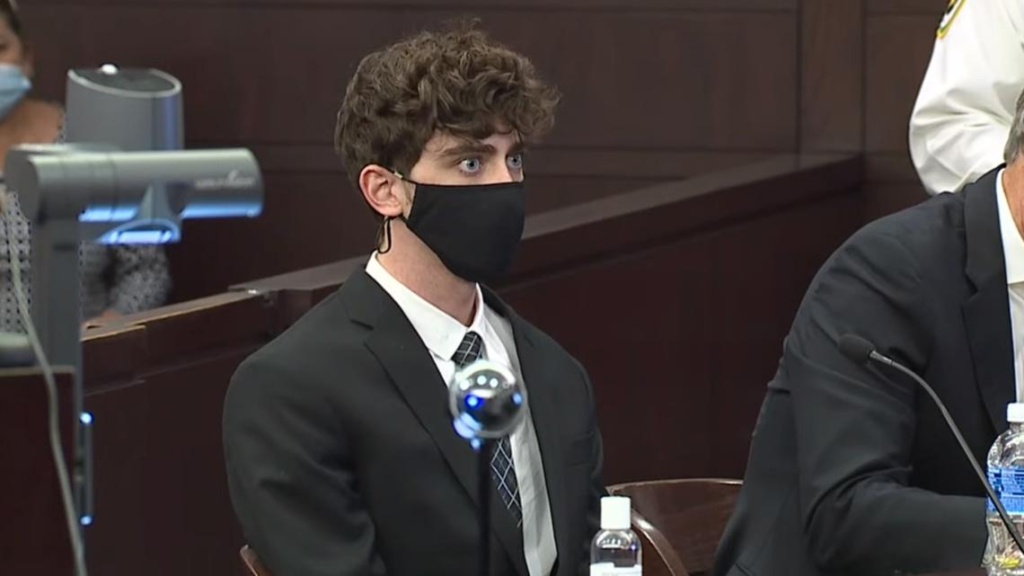Cameron Herrin, a young man with a seemingly bright future ahead of him, became a figure of national attention after being involved in a tragic car accident that claimed the lives of a mother and her young daughter. The incident shocked the public and quickly spiraled into a legal battle that captured widespread media coverage. Herrin’s case is a somber reminder of how a split-second decision can irrevocably alter the course of many lives. In this article, we will explore the details of the car accident, the legal consequences that followed, and where Cameron Herrin stands today in the aftermath of this tragic event.
The Day of the Accident
The tragic event that forever changed Cameron Herrin’s life occurred on May 23, 2018, in Tampa, Florida. Herrin, who was just 18 years old at the time, was driving a brand-new Ford Mustang along Bayshore Boulevard, a scenic but heavily trafficked road. He was not alone; his friend John Barrineau was driving a gold Nissan alongside him. The two were reportedly involved in an illegal street race, a dangerous activity that often leads to severe consequences. On this day, the consequences were more severe than anyone could have imagined.
As Herrin and Barrineau raced down the boulevard, reaching speeds of over 100 mph, they approached a pedestrian crosswalk where Jessica Reisinger-Raubenolt and her 21-month-old daughter, Lillia, were crossing. Jessica was pushing Lillia in a stroller when Herrin’s Mustang struck them at a high speed. The impact was devastating; both Jessica and her daughter were killed almost instantly. The horrific nature of the accident sent shockwaves through the community and drew significant media attention, putting Herrin at the center of a tragic narrative that would unfold in the courtroom.
Legal Proceedings and Sentencing
In the immediate aftermath of the accident, Cameron Herrin was charged with two counts of vehicular homicide. His friend, John Barrineau, also faced charges, but it was Herrin who bore the brunt of the legal and public scrutiny. The case quickly became a high-profile one, with the media covering every twist and turn in the legal proceedings. Herrin’s defense team argued that while the accident was undeniably tragic, it was not intentional. They claimed that Herrin had no prior history of reckless driving and that he was deeply remorseful for the lives lost.
Despite these arguments, the evidence against Herrin was overwhelming. Eyewitness accounts, surveillance footage, and data from the Mustang’s event data recorder (often referred to as a “black box”) all pointed to the fact that Herrin was driving at an extremely high speed and engaged in illegal street racing at the time of the accident. In April 2021, nearly three years after the incident, Cameron Herrin was sentenced to 24 years in prison. The sentence was handed down by Judge Christopher Nash, who cited the need to send a strong message about the dangers of reckless driving. The judge noted the severity of the crash and the irreversible impact it had on the victims’ families, stating that the punishment needed to reflect the gravity of the offense.

Public Reaction and Controversy
The sentencing of Cameron Herrin sparked a wide range of reactions from the public. While many people agreed that Herrin’s actions deserved severe punishment, others felt that the 24-year sentence was excessively harsh for a young man with no prior criminal record. The case became a point of discussion on social media, where opinions were sharply divided. Some people expressed sympathy for Herrin, noting that he was only 18 years old at the time of the accident and that his life was now effectively ruined. Others, however, pointed out that two innocent lives were lost due to his reckless behavior and that the sentence was justified.
Adding to the complexity of the public’s reaction was the emergence of online campaigns advocating for Herrin’s release or a reduction in his sentence. These campaigns gained traction on platforms like TikTok, where users posted videos and comments supporting Herrin and calling for justice reform. The hashtag #CameronHerrin trended multiple times, and some of these posts garnered millions of views. However, the family of the victims and others opposed these efforts, arguing that the focus should remain on the lives lost rather than on the perpetrator. The controversy highlighted the tension between justice and mercy, a debate that continues to this day.
Life in Prison
Since his sentencing, Cameron Herrin has been serving his time in a Florida state prison. The transition from a life of relative privilege and freedom to the harsh realities of prison life has been undoubtedly challenging for Herrin. According to reports, he has expressed deep remorse for his actions and has struggled with the weight of the consequences he now faces. Prison life is a far cry from the world Herrin once knew, and the adjustment has likely been difficult both mentally and emotionally.
Herrin’s family has remained supportive, visiting him regularly and advocating for a reduction in his sentence. They have expressed hope that Herrin can use his time in prison to reflect on his actions and eventually reintegrate into society as a changed man. However, the possibility of early release or a reduced sentence seems unlikely at this point, given the seriousness of his crime and the attention his case has received. Herrin is expected to serve the majority, if not all, of his 24-year sentence, a reality that underscores the long-term impact of his tragic decision.
The Broader Impact of the Case
The Cameron Herrin case has had broader implications beyond the immediate tragedy of the accident. It has sparked discussions about the dangers of street racing, particularly among young drivers, and the role of social media in shaping public perception of criminal cases. Street racing is a dangerous activity that has claimed numerous lives over the years, and the Herrin case has been used as an example by law enforcement agencies to discourage others from engaging in similar behavior. The high-profile nature of the case has led to increased awareness and stricter enforcement of laws related to reckless driving and street racing.
Moreover, the online campaigns and social media discussions surrounding Herrin’s sentencing have raised questions about the influence of public opinion on the justice system. While social media can be a powerful tool for raising awareness and advocating for change, it can also distort facts and create a narrative that overshadows the reality of the situation. In Herrin’s case, the sympathy generated online for the perpetrator has, in some ways, complicated the public’s understanding of the tragedy and its consequences. This has led to a broader conversation about the role of empathy in justice and the challenges of balancing compassion with accountability.

Where Is Cameron Herrin Now?
As of today, Cameron Herrin remains incarcerated in a Florida state prison, serving out his 24-year sentence. His case continues to be a topic of discussion, both online and offline, as people grapple with the complex issues it raises. While Herrin’s life has been irrevocably altered by his actions, the families of Jessica Reisinger-Raubenolt and her daughter Lillia continue to mourn their loss. The pain and grief caused by the accident are felt by many, serving as a stark reminder of the far-reaching consequences of reckless behavior.
Herrin’s future remains uncertain. Once he has served his sentence, he will be a middle-aged man reentering a world that has changed significantly during his time in prison. The question of whether he will be able to rebuild his life and contribute positively to society is one that only time will answer. For now, Cameron Herrin’s story stands as a cautionary tale, a tragic example of how a single moment of recklessness can have devastating and lifelong repercussions.
Conclusion
The story of Cameron Herrin is one marked by tragedy, loss, and the far-reaching consequences of a brief but reckless decision. The fatal car accident that claimed the lives of Jessica Reisinger-Raubenolt and her daughter Lillia has had a profound impact not only on their family but also on Herrin himself, his family, and the wider community. While Herrin serves a lengthy prison sentence for his role in the accident, the case continues to provoke discussion and debate, particularly in the age of social media where narratives can quickly shift and spread. As Herrin remains in prison, the ongoing conversation about justice, accountability, and the potential for redemption continues, highlighting the complexities of dealing with such a tragic event.


































